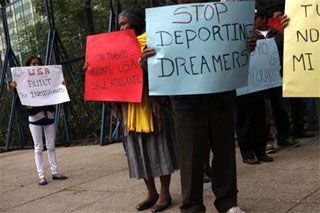 | « Back to article | Print this article |
The president's moves will make it easier for entrepreneurs to work in the United States
 Silicon Valley expected President Barack Obama to make life a little easier for foreign workers, but tech industry representatives were disappointed that his immigration rule changes will not satisfy longstanding demands for more visas and faster green cards for high-skilled employees.
Silicon Valley expected President Barack Obama to make life a little easier for foreign workers, but tech industry representatives were disappointed that his immigration rule changes will not satisfy longstanding demands for more visas and faster green cards for high-skilled employees.
Obama, in a speech outlined plans to use his executive authority to help millions of undocumented people. He also announced minor adjustments that could cut through some red tape for visa holders and their families, including letting the spouses of certain H-1B holders get work permits.
Full text of Barack Obama's speech
The president's moves will make it easier for entrepreneurs to work in the United States and extend a program letting foreign students who graduate with advanced degrees from US universities to work temporarily in the United States, sources said.
But tech industry insiders said the changes, while positive, were very limited.
"This holiday season, the undocumented advocacy community got the equivalent of a new car, and the business community got a wine and cheese basket," one lobbyist said, speaking on condition of anonymity.
Instead of more temporary H-1B visas, the 200,000-member US chapter of the Institute of Electrical and Electronics Engineers was hoping for measures to reduce the backlog of H-1B holders waiting for green cards.
"If this is all there is, then the President has missed a real opportunity," said Russ Harrison, a senior legislative representative at the IEEE. "He could have taken steps to make it easier for skilled immigrants to become Americans through the green card system, protecting foreign workers and Americans in the process."
For instance, the IEEE and technology companies want spouses and children to be excluded from employment-based green-card caps, thereby increasing their availability for other foreign tech workers waiting for green cards.
Intel Corp, which has around 2,500 H-1B employees, will keep pressing legislators, said Peter Muller, the chipmaker's director of government relations.
"In the end we really need Congress to act, so we're going to continue that push," Muller said.
Tech companies from Microsoft Corp to Intel have long complained about being unable to find enough highly skilled employees and want Washington to increase the number of temporary work visas available for programmers, engineers and other specialized foreign professionals.
"Our focus really is on H-1B visas and trying to expand the number of talented technical professionals that can come to the US," Qualcomm CFO George Davis said on Wednesday ahead of Obama's announcement. "The way the regulations are drafted today there's a lot of room for improvement."
Major changes would require Congressional action, however, and some tech industry lobbyists in Washington said they are worried that partisan rancor over Obama's unilateral action could set back the chances for legislation.
While limited, Obama's tweaks to immigration policy, such as the provision to let more spouses work, may be meaningful to some tech workers and their families.
Gayathri Kumar, 29, moved a year ago from India to Phoenix, Arizona, where her husband does R&D at a semiconductor company. She has a masters degree in communications and wants to work in television, but Kumar spends much of her day at home, chatting with friends over social media.
"I really want to work. I came here with a passion to work, not to sit at home," Kumar said. "I'm bored, I'm becoming depressed."
